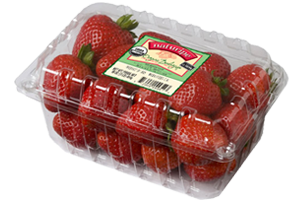I spend a lot of time in supermarkets, and I’ve never seen this…

…until this weekend. No idea what is going on here, but it was a pretty clean cut straight through that banana.
I spend a lot of time in supermarkets, and I’ve never seen this…

…until this weekend. No idea what is going on here, but it was a pretty clean cut straight through that banana.
Much of the D.C. deer population have completed a quick journey from USDA sharpshooters scopes to soup kitchen plates. D.C. Central Kitchen recently received 600 pounds of ground venison from the National Park Service’s (necessary/unnecessary?) deer cull in Rock Creek Park.
— —
If supermarkets aren’t going to dramatically reduce their waste, the least they can do is create electricity while keeping it out of the landfill. A new anaerobic digestion facility at a Los Angeles distribution center for two Kroger affiliates is doing just that (while the stores also hope to create less food waste). FEED Resource Recovery developed the project, which can process 300,000 pounds of organic materials daily.
— —
Displeased with the level of voluntary waste reporting from the UK food industry, the awareness group This Is Rubbish recently called for mandatory food waste audits within the food industry.
— —
Finally, when life gives you food waste, Brazilian graffiti artist Narcélio Grud turns it into art. Hey, that’s better than landfilling it.
I’ve been thinking a lot about packaging recently, as I’ve been writing something about Austin’s mostly packaging-free grocer, in.gredients. From a life-cycle assessment perspective, packaging is environmentally harmful. It’s just more stuff we’re using oil to create, often unnecessarily, that usually ends up in a landfill.
Yet, it’s not that simple. Â Smarter packaging could limit food waste. And when you look at the inputs that go into producing our food (especially proteins) and the emissions that come from our food system (especially livestock), I’m guessing there’s a beneficial tradeoff with packaging that prevents food waste.
 I say ‘guessing,’ because I haven’t seen a fabulous study comparing the impact of food waste with that of packaging (with an estimate on how much food waste is avoided through packaging). This EPA study looks at tomatoes, but it’s limited because no US retailers would provide tomato waste data (only Marks & Spencer, a UK retailer cooperated).
I say ‘guessing,’ because I haven’t seen a fabulous study comparing the impact of food waste with that of packaging (with an estimate on how much food waste is avoided through packaging). This EPA study looks at tomatoes, but it’s limited because no US retailers would provide tomato waste data (only Marks & Spencer, a UK retailer cooperated).
So how does packaging reduce food waste? Packaging protects delicate foods and keeps cut and prepared foods from exposure to oxygen (and the associated decomposing). And here are some related ideas from WRAP:
Suggestions included providing better information on keeping food ‘fresher for longer’, improving the recyclability of packaging and using campaigns such as ‘Love Food Hate Waste’ to encourage customers to reduce food waste.
Few people consider these benefits of food packaging.  Despite all the attention paid to food waste in the UK, most Britons are convinced that good packaging is an oxymoron.
At this point, I’m not entirely sure how to view packaging compared to food waste. (It is worth noting, though, that making packaging lighter can be a useful compromise.) Still, I’m pretty sure that packaging isn’t quite the environmental ill that some see it as. Â
Wasted food = wasted water. This handy Ecocentric blog post reminds us of that truth.
— —
Mixed news from Massachusetts: The DEP confirmed its upcoming 2014 commercial food waste ban and pushed for a 30 percent waste reduction by 2020 (Hooray!). But it also announced that they would remove the moratorium on building new trash-burning (not to be confused with actual waste-to-energy) facilities (Boooo).
— —
Across the pond, UK retailers have voluntarily agreed to food and packaging waste goals. It’s the third such agreement, called the Courtauld Commitment. Meanwhile, British retailer Waitrose announced an ambitious plan to exceed those goals by halving food packaging by 2016.
— —
Finally, I enjoyed the message about conflicting government programs leading to food waste in this Detroit News blog post, but I wanted more details. Give me an example!
It’s always nice to see good empowered. Especially when that good is an organization run by young adults.
Yesterday, the youth-powered Food Recovery Network received a cool $150,000 grant from the Sodexo Foundation to redistribute edible but unsellable food to people who need it.
With this grant money, FRN will bring on full-time staff, provide grants to chapters and further solidify the organization. The college food recovery organization has chapters at more than 20 schools and has recovered more than 130,000 pounds since launching in 2011.
So just what does a Food Recovery Network chapter look like? Sort of like this:
City Harvest does fabulous work recovering edible but unsellable food in New York City. Now, with a new, 45,000 square foot facility in Queens, they’ll be even more efficient in their work.
Watch City Harvest’s new food rescue facility being built…very quickly!
Not every state has its own Waste Reduction Center. Even fewer have a state-wide Food Waste Reduction Project. Actually, I can’t think of one.
While Iowa has long had the former (a part of the University of Northern Iowa for 25 years), it just now has the latter with the launch of the Iowa Food Waste Reduction Project site.
 While in Iowa this week I had the chance to meet with a staffer from the fledgling project, and I’m excited to see how much they can accomplish. The Project will focus on reducing the amount of waste created and then diverting the existing waste from landfills.
While in Iowa this week I had the chance to meet with a staffer from the fledgling project, and I’m excited to see how much they can accomplish. The Project will focus on reducing the amount of waste created and then diverting the existing waste from landfills.
The site serves as a resource for all sides of the food waste coin, providing strategies for waste reduction (from homes to restaurants to institutions) as well as connecting waste generators with potential food waste recycling options. In addition to serving as a hub for food waste info, the Project will first focus on outreach to the largest food waste generators–institutions like hospitals and schools.
In the coming months, they will  also identify barriers to food waste reduction and recycling and push for policy changes to ease both. Sounds exciting and progressive! Stay tuned…
Well that’s unfortunate.
British politicians and/or the British media have politicized advice on reducing food waste. The Independent reported Environment Minister Richard Benyon’s remarks about families losing £50 per month through waste and follows it with objections from the opposition.
As an American, I’m not aware of all the subtle class machinations and tax policy at play here. But…it seems as if some people deem any words on avoiding food waste from Conservative Party politicians as insulting. To wit:
Mary Creagh MP, Shadow Environment Secretary, said:“Mums struggling to feed their families don’t need lectures on wrapping cheese from a Tory Government which has created a cost of living crisis with its failed economic plan.
It seems that these are two separate things. I’d imagine many people could still use some reminders about proper food storage and buying habits to avoid waste. AND the cost of food is rising, due to many factors.
I find this statement from Benyon to be pretty sensible:
Food wasted means fewer pounds in our pocket. Household bills are squeezed at the moment and we have the opportunity through a variety of different agencies to inform people better about where their food comes from and how to use it most economically.
It would be one thing if the Tories were saying families should cut waste as an alternative to hunger assistance or government programs, as the Mirror hints (without much basis, it seems–note what is and isn’t an actual quotation). But if it’s just good old conservative (lower case ‘c’) advice, that’s another thing.
To be clear, I understand how budget tips  from a millionaire (Benyon) could be hard to take. Especially if you dislike that politician or his party. But isn’t part of the Environment Minister’s job to curb food waste? Perhaps he’s just continuing the work of previous Labor Environment Ministers who said identical things (because they just make good sense). I’d love to hear your thoughts on the political and media implications of this duality.
More than 100 New York City restaurants–including ones owned by Mario Batali, Lidia Bastianich and Danny Meyer–have pledged to cut their waste in half. One thing conspicuously absent in the writeup was any kind of timeline. Still, great news!
— —
The GRACE Communications Foundation (the folks behind The Meatrix) just launched a new site on food waste, and it’s a great resource for delving into the topic.
— —
This interview with Univ. of British Columbia professor Jim Vercammen provides a Canadian, or at least North American, view on food waste. That it’s from a radio show called Trash Talkin’ makes it even better.
— —
Food Tank reports on various campus efforts to fight food waste. Meanwhile, the Univ. of California at Merced is doing its best to curb food waste to meet its laudable goal of zero landfill waste by 2020.
 —
—
I enjoy Judge John Hodgman‘s brand of fake internet justice, but this case hits close to home as it centers on food safety and what we can or should do to avoid food waste, all in the show’s usual tongue-in-cheek manner.
Alton Brown is the expert witness and he debunks the myth of expiration dates and rails against overbuying at the supermarket. Here’s the link or listen here:
With a nice ‘not only on Earth Day’ lead, Iowa City’s Press-Citizen praises the voluntary composting of many area restaurants and supermarkets. That’s encouraging.
Less encouraging news from the article: a bill that would curb the amount of food waste sent to landfills remains stalled in the Iowa House Natural Resources Committee. The bill previously passed the Senate, but, according to a previous article, “the odds are unlikely it will be approved” in the Republican-controlled House.

The committee’s failure to at least discuss the measure reeks of shortsightedness. The opposition likely stems from businesses balking at being required to compost, yet that tiny operational change may save restaurants and retailers money–while helping the same earth we all paid lip service to on Monday.
[Iowa City Recycling Coordinator Jennifer] Jordan said that diverting waste actually can be cheaper for businesses in the long run because the landfill charges $14 a ton less to take in organic waste.
Hopefully, the Committee members–aided by their constituents’ input!–won’t deal these young Iowa City students a real world lesson in protected interests trumping the common good. Because, we all lose when food goes to the landfill.